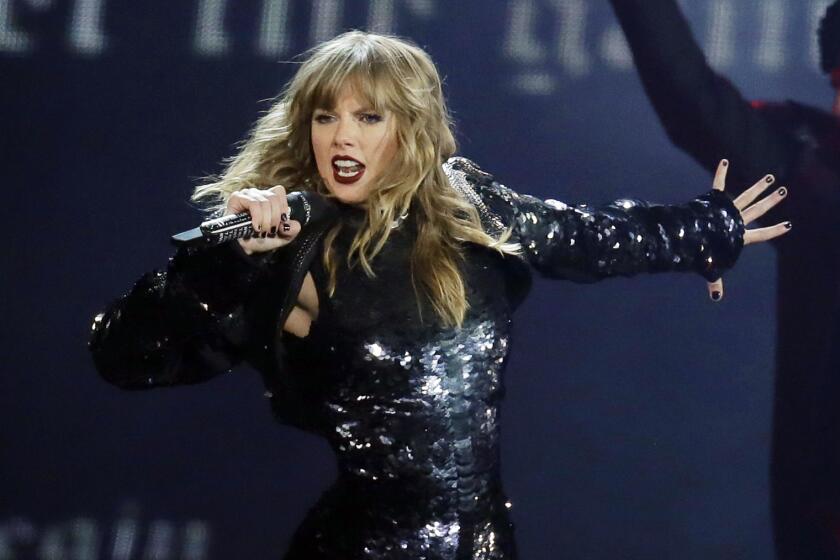In a year of great pop music, Katy Perry’s latest is pop trash

- Share via
When in doubt, call in the kid.
That’s the unfortunate stratagem Katy Perry resorts to at the end of her new album, “143,” in a groaner of a closer called “Wonder” that features a guest turn by the singer’s 4-year-old daughter, Daisy.
Like a copy of a copy of her decade-and-a-half-old “Firework,” “Wonder” has Perry exhorting Daisy to stay innocent in a cynical world — to keep the fire lit in her heart, to keep the weight of reality off her wings, to resist letting “the envious ones say that you’re just a weed.” (No, really.) By spotlighting her child’s untrained warble, Perry is attempting to demonstrate the human stakes of that undertaking while showing us that, as a record maker, she’s living by her own advice.
She’s also, of course, daring us to scoff.
But scoff I must: On an album slick with flop sweat, poor little Daisy comes across not as a beneficiary of Perry’s motherly encouragement but as a victim of her creative desperation.

Anyone could understand why Perry was feeling adrift going into “143,” which comes a few months after she wrapped her seven-season run as a judge on “American Idol.” At 39 — and with a pair of largely unsuccessful LPs behind her in 2020’s “Smile” and 2017’s “Witness” — Perry is already past the age when female pop stars encounter the brutal disinterest of a music business preoccupied with novelty and youth; indeed, she was battling the perception of obsolescence even before the emergence this past summer of Sabrina Carpenter and Chappell Roan, both of whom no doubt put the scare into a superstar like 31-year-old Ariana Grande.
Perry’s determination to get back in the game is clearly what led her to reteam with Dr. Luke, the songwriter and producer with whom she made many of her biggest hits — including four of the five No. 1 singles from 2010’s 10-times-platinum “Teenage Dream” — in spite of a rape accusation Kesha made against him in 2014. (Last year, Kesha and Dr. Luke announced that they’d reached a settlement in their long-running legal drama, with the producer insisting he was “absolutely certain that nothing happened” on the night she claims he drugged and assaulted her.)
Whether or not Perry anticipated the considerable blowback triggered by her and Luke’s reunion — he oversaw all but one of the 11 tracks on “143” — she was right to bet that audiences would forgive her decision provided she came with bangers: Just look at the relative lack of outrage over Doja Cat’s work with Luke on her smash “Say So” and Latto’s work with him on the Grammy-nominated “Big Energy.”
Taylor Swift unleashes her influence against the Trump-Vance ticket by endorsing Kamala Harris after fake AI images online suggested the megastar backs the Republicans.
The problem for Perry is that these songs are bad, and not even in a fun way. “143” is an oddly cold dance-pop album with boring melodies, utilitarian grooves and vocal performances that feel vaguely AI-derived; Perry writes and sings with none of the genuine emotional yearning or the sharp sense of humor that defined classics like “California Gurls” and the title track from “Teenage Dream,” which is probably why 21 Savage felt entitled to show up in “Gimme Gimme” and rhyme “I heard you gotta jump just to put on your jeans” (OK) with “I’m like Amazon ’cause I got what you need” (jeez).
I’ll spare you any more lyrical quotations except to point out that the best Perry can do in “Artificial,” which wants to make some kind of point about the encroachments of technology, is to describe herself as “a prisoner in your prison.”
A prisoner — in your prison.
“143’s” saucelessness is all the sadder given that pop music, after years of gloomy whispering, has finally circled back around to the wit and pageantry of Perry’s glory days. The success of sparkly bops like Carpenter’s “Espresso” and Roan’s “Hot to Go!” proves that listeners are hungry for what Perry used to serve up, albeit now on the condition that it contain the kind of endearing quirk — Carpenter’s daffy neologisms in “Espresso,” for instance — that Perry seems paradoxically to have avoided in her eagerness to please.
“I wanna know the truth, even if it hurts me,” she sings in “Truth,” so here it is: “143” isn’t a failure of circumstance — it’s a failure of imagination.
More to Read
The biggest entertainment stories
Get our big stories about Hollywood, film, television, music, arts, culture and more right in your inbox as soon as they publish.
You may occasionally receive promotional content from the Los Angeles Times.












